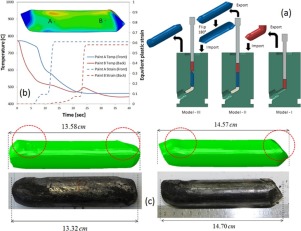当前位置:
X-MOL 学术
›
J. Mater. Process. Tech.
›
论文详情
Our official English website, www.x-mol.net, welcomes your feedback! (Note: you will need to create a separate account there.)
A computational investigation of Equal Channel Angular Pressing of molybdenum validated by experiments
Journal of Materials Processing Technology ( IF 6.3 ) Pub Date : 2019-02-01 , DOI: 10.1016/j.jmatprotec.2018.09.032 E. Priel , B. Mittelman , N. Trabelsi , Y. Cohen , Y. Koptiar , R. Padan
Journal of Materials Processing Technology ( IF 6.3 ) Pub Date : 2019-02-01 , DOI: 10.1016/j.jmatprotec.2018.09.032 E. Priel , B. Mittelman , N. Trabelsi , Y. Cohen , Y. Koptiar , R. Padan

|
Abstract Equal Channel Angular Pressing (ECAP) is a metal forming process which is commonly used to refine grain structure in metals. The process involves pushing a billet, under high pressures, through a curved channel. Metal forming of molybdenum necessitates high forming temperatures so as to sufficiently lower the flow stress and increase ductility. These high temperatures are greater than the maximal temperature of the steel tools which are heated to a lower temperature then the billet. As a result great thermal gradients may develop during the forming process. In this study, the thermo-mechanical coupling between the temperature and deformation fields in ECAP of molybdenum was investigated using a computational/experimental methodology. First, the flow stress of molybdenum and copper (used as a dummy-block in the ECAP process) and the friction conditions with the steel tools at different temperatures were determined using cylindrical and ring compression tests in conjunction with an iterative coupled finite element analysis. Finally, a multi-stage finite element model of molybdenum ECAP was developed and validated by comparison to experiments. The computational results show that, in each pass, large temperature gradients develop across the specimen. While material points at the front and back of the billet may undergo similar equivalent plastic strains they deform at very different temperatures of T = 600 °C and T = 480 °C respectively. As a result, even after a single pass, each material point may have undergone a very different thermo-mechanical process. These differences in thermo-mechanical histories may lead to different microstructural changes along the specimen.
中文翻译:

经实验验证的钼等通道角挤压计算研究
摘要 等通道角挤压(ECAP)是一种金属成形工艺,常用于细化金属中的晶粒结构。该过程包括在高压下推动钢坯通过弯曲的通道。钼的金属成型需要高成型温度,以充分降低流动应力并增加延展性。这些高温高于钢工具的最高温度,钢工具被加热到比钢坯更低的温度。因此,在成型过程中可能会产生很大的热梯度。在这项研究中,使用计算/实验方法研究了钼 ECAP 中温度和变形场之间的热机械耦合。第一的,钼和铜的流动应力(在 ECAP 工艺中用作模拟块)以及在不同温度下与钢工具的摩擦条件是使用圆柱和环压缩测试结合迭代耦合有限元分析确定的。最后,开发了钼 ECAP 的多阶段有限元模型,并通过与实验的比较进行了验证。计算结果表明,在每次通过时,整个试样都会产生大的温度梯度。虽然坯料正面和背面的材料点可能会承受类似的等效塑性应变,但它们会在非常不同的温度下变形,分别为 T = 600 °C 和 T = 480 °C。因此,即使在单次通过后,每个材料点也可能经历了非常不同的热机械过程。
更新日期:2019-02-01
中文翻译:

经实验验证的钼等通道角挤压计算研究
摘要 等通道角挤压(ECAP)是一种金属成形工艺,常用于细化金属中的晶粒结构。该过程包括在高压下推动钢坯通过弯曲的通道。钼的金属成型需要高成型温度,以充分降低流动应力并增加延展性。这些高温高于钢工具的最高温度,钢工具被加热到比钢坯更低的温度。因此,在成型过程中可能会产生很大的热梯度。在这项研究中,使用计算/实验方法研究了钼 ECAP 中温度和变形场之间的热机械耦合。第一的,钼和铜的流动应力(在 ECAP 工艺中用作模拟块)以及在不同温度下与钢工具的摩擦条件是使用圆柱和环压缩测试结合迭代耦合有限元分析确定的。最后,开发了钼 ECAP 的多阶段有限元模型,并通过与实验的比较进行了验证。计算结果表明,在每次通过时,整个试样都会产生大的温度梯度。虽然坯料正面和背面的材料点可能会承受类似的等效塑性应变,但它们会在非常不同的温度下变形,分别为 T = 600 °C 和 T = 480 °C。因此,即使在单次通过后,每个材料点也可能经历了非常不同的热机械过程。



























 京公网安备 11010802027423号
京公网安备 11010802027423号